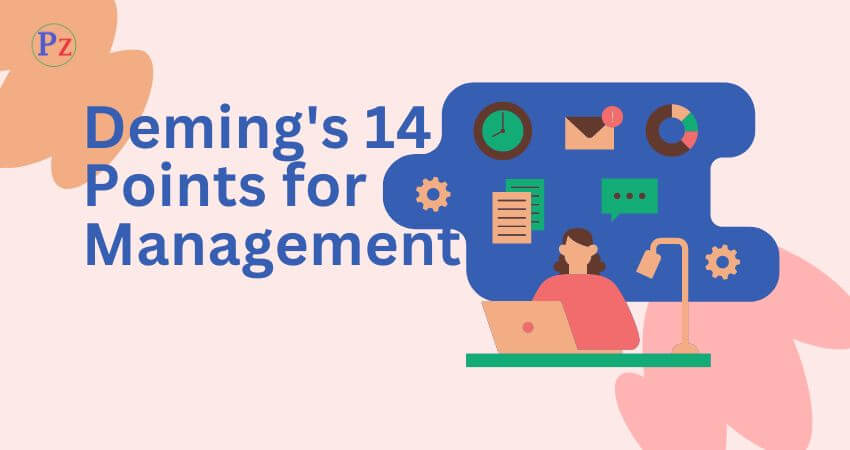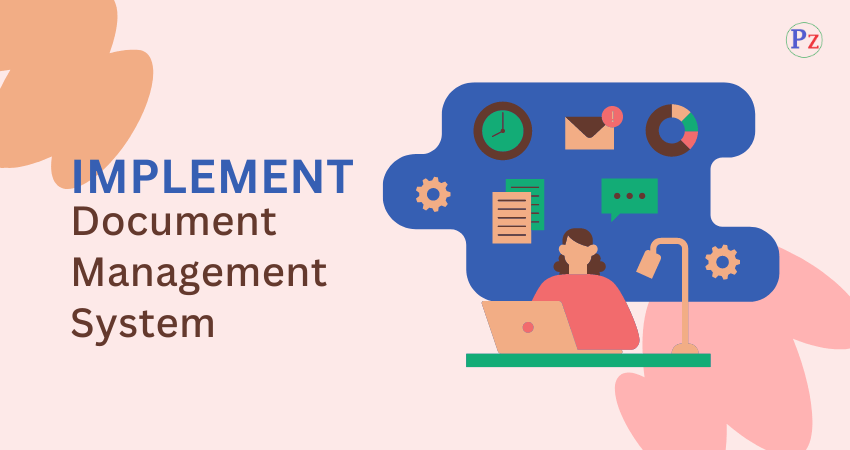DEMING’s 14 POINTS FOR MANAGEMENT
✔ Deming firmly believed that the managers rather than workers or other resources as the real obstacle for successful TQM implementation. He proposed his views on management and its relationship with quality in his 14 points for management.
✔ Deming’s 14 points for management are summarised in Table 1.1.

| Point 1: Create constancy of purpose for continual improvement of product and service |
| Point 2: Adapt the new philosophy |
| Point 3: Cease dependence on inspection |
| Point 4: End the practice of awarding business on the basis of price tag alone |
| Point 5: Improve constantly and forever the system |
| Point 6: Institute training |
| Point 7: Institute leadership |
| Point 8: Drive out fear. Create trust. Create a climate for innovation |
| Point 9: Break down barriers between departments and individuals |
| Point 10: Eliminate exhortations for the workforce |
| Point 11: Eliminate numerical quotas for the workforce |
| Point 12: Remove barriers that rob people of pride of workmanship |
| Point 13: Encourage education and self-improvement for everyone |
| Point 14: Take action to accomplish the transformation |
The above Deming’s 14 points for top management are described below.
Point 1: Create Constancy of Purpose for Improvement of Product and Service
✔ Management must change from a preoccupation with the short run to building for the long run. The management must define its values, mission and vision of the future to provide long-term direction for the organisation.
✔ Deming believed that businesses are social entities whose basic purpose is to serve their customers and employees. To do this, they must take a long-term view and invest in innovation, training and research.
Point 2: Adopt the New Philosophy
✔ Top management and everyone must learn and adopt the new philosophy. We are in a new economic age. We can no longer live with commonly accepted levels of delays, mistakes, defective materials, and defective workmanship. Transformation of Western management style is necessary to halt the continued decline of business and industry.
✔ Adopt the new philosophy means change. The changes needed in industry require a complete new outlook on management and industry by raising the expectations of quality.
✔ Today’s management is learning, unlearning and relearning the subject matter relevant to the organisation. It is the speed and frequency with which the organisation and its employees learn a new philosophy will decide the growth rate and the market share of the organisation.
Point 3: Cease Dependence on Inspection
✔ Management should not depend on mass inspection since mass inspection is costly and unreliable. Instead the management must use statistical sampling techniques.
✔ Deming emphasized on use of statistical techniques in the area of inspection to bring the process into control.
- Inspection does not improve quality, nor guarantee quality. Inspection is too late. The quality, good or bad, is already in the product.
- Mass inspection is unreliable, costly, ineffective. It does not make a clean separation of good items from bad items.
- Inspector fails to agree with each other. They fail to agree with themselves. Routine inspection becomes unreliable through boredom and fatigue.
- In contrast, the inspection of small samples of product for control charts to achieve or to maintain statistical control can be a professional job. Inspectors of vendor and customer have time to compare their instruments and tests, to learn to speak the same language.
Point 4: End the Practice of Awarding Business on the basis of Price Tag alone
✔ The management must stop awarding business (tender contracts) to the suppliers solely based on the price (low bid). Instead other meaningful parameters such as quality, delivery, service, along with price, should be considered for selecting the supplier.
✔ This principle addresses supplier partnership. Deming advocates for reduced number of suppliers for the same item and the suppliers need to be treated as partners of the organisation.
✔ The aim is to have a single supplier for each item to develop a long-term relationship of loyalty and trust, so as to have better control and consistency in the supplies. If we change suppliers frequently for cheaper price, the quality of supplies will never stabilize.
Point 5: Improve Constantly and Forever the System
✔ Management must improve constantly and forever the system of planning, production, and service, in order to improve every process and activity in the organisation, to improve quality and productivity and thus constantly decrease costs.
✔ It is the management’s responsibility to work continually on the system (design, incoming materials, maintenance, improvement of machines, supervision, training, retraining, procurement, transportation, engineering sales, distribution, accounting, payroll, customer service, etc).
✔ This principle addresses the continuous process improvement aspect of the TQM.
Point 6: Institute Training
✔ The organisation must institute modern methods of training on the job for all, including management, to make better use of every employee.
✔ Training is required to orient the employees with the new skills. New skills are required to keep up with the changes in materials, methods, product design, machinery, techniques, and service.
✔ For continuous improvement, employees (both management and workers) require the proper tools and knowledge. People are an organisation’s most valuable resource and the management must take the responsibility of training them on their jobs.
✔ All employees should be trained in statistical tools for solving quality problems.
✔ Not only does training result in improvement in quality and productivity, but it adds to worker’s morale and removes barriers between workers and supervisors.
Point 7: Institute Leadership
✔ The job of managers is leadership, not supervision. Supervision is simply overseeing and directing work, whereas leadership means providing guidance to help employees do their jobs better. Improving supervision is management’s responsibility.
✔ By adopting and instituting leadership, the employees will be able to do their jobs better.
✔ Management must provide supervisors with training on statistical methods and all these 14 points so the modern methods of supervision can be implemented.
Point 8: Drive out Fear. Create Trust. Create a Climate for Innovation
✔ Management must drive out fear by encouraging everybody in the organisation to ask questions, to report problems, or to express ideas.
✔ Deming identified fear as a major obstacle to improve efficiency and effectiveness and a major barrier to change and survival. Fears can result in tremendous economic losses. Therefore the management must encourage effective two-way communication and other means to drive out fear throughout the organisation so that everybody may work effectively and more productively for the company.
Point 9: Breakdown Barriers between Departments and Individuals
✔ Management must optimize the efforts of teams, work groups and staff areas so that to break down barriers between departments and individuals.
✔ People in different departments/areas such as research, design, procurement, manufacturing, sales, administration, must work in teams to tackle problems that may be encountered with products or service.
✔ Interdisciplinary teams (such as quality circles) and team work can help to break down barriers between departments and individuals that can help improve design, service, quality and costs.
Point 10: Eliminate Exhortations for the Work Force
✔ Targets, slogans, posters and pictures urging people to increase productivity must be eliminated. Most of the necessary changes are out of worker’s control so such exhortations merely cause resentment.
✔ The posters directed at workers such as ‘Achieve zero defects’, ‘Do it right the first time’, ‘Improve productivity and quality’, etc., will generate frustration and resentment among workers. The best strategy only for improvement is to correct defects in the system, not slogans or posters.
Point 11: Eliminate Numerical Quotas for the Workforce
✔ Work standards that prescribe quotas for the work force and numerical goals for people in management must be eliminated.
✔ Setting a numerical target (for operators) for production, say producing 500 units/shift, etc., may affect the quality of workmanship. This forces the worker to ignore quality and concentrate on quantity which is detrimental to the organisation.
✔ Setting numerical goals such as business growth or cost reduction for the management people without the necessary wherewithal does not work. Such improvements should arise out of improving processes and not by passage of time.
Point 12: Remove Barriers that Rob People of Pride of Workmanship
✔ It is the responsibility of the top management to remove the barriers that deprive the employees of their right to pride of workmanship.
✔ This implies, among the other things, abolition of the annual merit rating (appraisal of performance) and of Management by Objective. Again, the responsibility of managers, supervisors, foreman must be changed from sheer numbers to quality.
✔ Deming believed that one of the highest barriers to pride in workmanship is performance appraisal. Performance appraisal destroys team work by promoting competition for limited resources, focusses on short-term and discourages risk taking.
Point 13: Encourage Education and Self-improvement for Everyone
✔ Management should encourage the employees to pursue higher education and training while in service, for improving the skills or updating knowledge.
✔ If an employee undergoes education or training, it will improve his ability, which will be beneficial to the organisation. Hence the employees should be encouraged and motivated to improve their knowledge and skills through various channels.
Point 14: Take Action to Accomplish the Transformation
✔ The permanent commitment of the top management should be clearly defined to ever improving quality and productivity, and their obligation to implement all these principles.
✔ A structure in the top management should be created that will push every day on the preceding 13 points, and take action in order to accomplish the transformation.
✔ For TQM to succeed, a firm’s top management must publicly demonstrate their vigorous commitment to ensure continuous quality improvement and innovation and they must openly practice what they preach.
| Read More Topics |
| Requirements of effective leadership |
| What are the customers perception on quality? |
| Gender sensitivity at work place |



